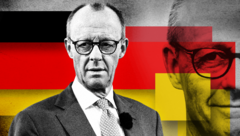Friedrich Merz, long a familiar face in conservative politics, embraces a risk-taking approach as he seeks the chancellorship, shifting the Christian Democratic Union's strategies toward the far right and revealing both potential and pitfalls as Germany gears up for its upcoming elections.
Friedrich Merz: The Bold Gambler in German Politics

Friedrich Merz: The Bold Gambler in German Politics
Friedrich Merz positions himself as a transformative candidate for Germany amidst a turbulent political landscape.
Friedrich Merz is increasingly seen as Germany's potential next leader, presenting himself as a solution to Europe's widespread political uncertainty. The 69-year-old, often regarded as a member of the conservative establishment, has stirred the political pot with his bold proposals to tighten immigration laws—a strategy that aligns him with the far-right politicians in the Bundestag. This shift diverges sharply from the center-ground approach championed by his predecessor Angela Merkel.
While Merz encountered setbacks with his recent immigration bill—ultimately failing to pass the proposal—his efforts nonetheless injected fresh energy into Germany's political discourse, ignited partly by the political upheaval following Chancellor Olaf Scholz's government collapse late last year. Once sidelined by Merkel’s leadership, Merz had ventured into the corporate world, seemingly stepping away from politics.
As the snap federal elections approach, Merz now stands poised for a comeback, reflecting a determination that suggests he might soon fulfill his long-held ambition for leadership. On a recent evening in one of Berlin's luxury hotels, he addressed a crowd on foreign policy. The reception was lukewarm, yet he remains steady in the polls, signaling potential electoral strength.
Born in 1955 in the conservative regions of West Germany, Merz was groomed for public life. Though he began his journey with moments of both mischief and rigor, his ambition propelled him into national politics where he ascended through various roles. His time in corporate sectors transformed him into a financially savvy candidate appealing to both traditional conservatives and investors looking for stability.
Despite Merz's attempts to reclaim the CDU's leadership from Merkel in previous years, his recent days of parliamentary activism reveal a sharper edge. He has sought votes from the controversial Alternative für Deutschland (AfD) party to push through tougher immigration rules—an action criticized as escalating tensions while also condemned by Merkel, who remains a powerful figure in German politics.
Though Merz's approach has polarized opinions, many supporters argue he is purposefully courting the far-right to integrate their followers into his the CDU fold—a strategy aiming to reclaim lost ground. Critics, however, argue that he risks alienating moderate conservatives as well as younger voters, leaving his long-term viability in question.
As election day draws near, observers speculate on possible coalition dynamics post-election, with anxieties stemming from Merz's alignment with the AfD, despite his denials of any formal collaboration. Nonetheless, his movements are being watched closely across Europe, as many hope for a decisive shift away from Germany's current political stagnation. Amidst the scrutiny and public reactions—both for and against—Merz's gamble may very well shape the future of Germany.





















